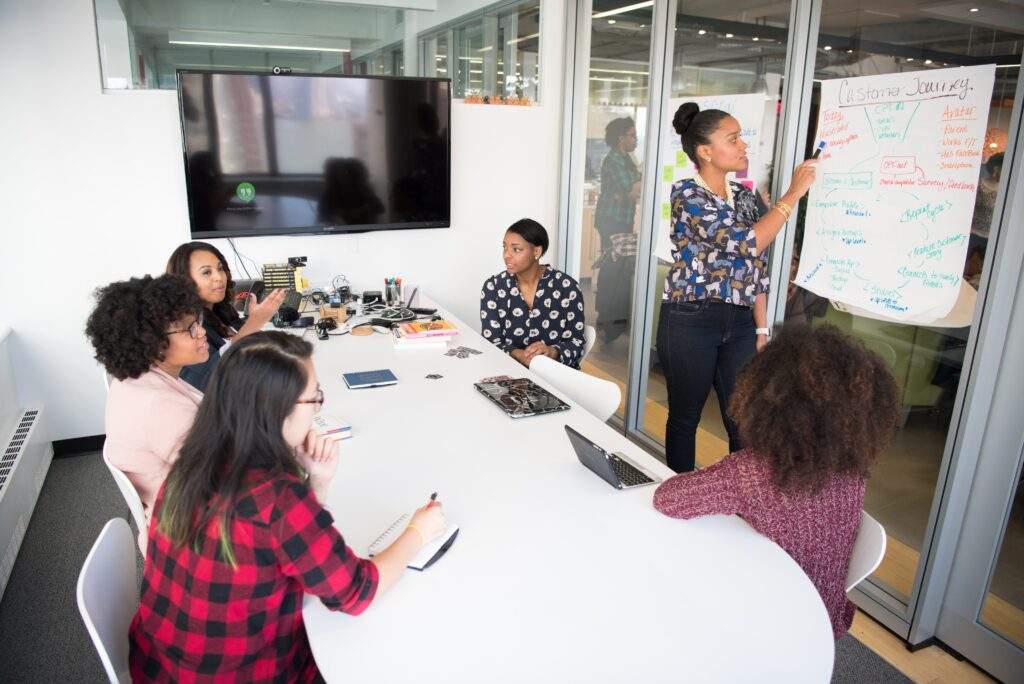Few things sell quite like confidence does. There is something both refreshing and captivating about people who walk into a room and are nothing but sure of themselves. You can be the most driven person in the world, but if you’re full of doubt, it’s not likely to get you anywhere in your career.
In order to sell confidence, though, you first have to attain it; that’s the tricky part.
There are many reasons for low confidence at work, but these obstacles can be learning opportunities if you’ll let them. If you’re one of the majority of people who aren’t naturally confident, you’re in luck.
As it turns out, confidence is mostly a skill learned through experience and practice.
Building a career takes time, so you’ll have plenty of opportunities to gain confidence as you establish yourself as a professional.
In the meantime, you can rely on these tips and tricks to help boost your self-confidence in the workplace and beyond.
1. Do Your Research

With books, television, and the Internet, the amount of knowledge available to us is endless. Do yourself a favor by constantly seeking to acquire more knowledge.
People who are always willing to learn, tend to know the most and trust themselves more when sharing their thoughts. They are the person that everyone wants to listen to and whose opinion stands out the most in a room.
If there’s a surefire way to be sure of yourself, it’s by knowing more than the person next to you (while simultaneously understanding how much more information is still out there).
2. Ask Questions

Asking questions is the only way to get better answers and solutions to the problems we (or our company) faces.
It’s not about asking as many questions as you can think of, it’s about asking the right questions.
Questioning spurs creativity and outside-the-box thinking encourages innovation, which promotes deeper analysis and understanding.
When you ask good questions, you’ll be more likely to get to the root cause of problems and create lasting change—rather than just putting a band-aid over the issue.
3. Find A Mentor

There’s no better way to learn than from someone who is in the position you desire to be in.
Before selecting a mentor, it’s important to know what you’re looking for and what types of goals you have for the mentorship.
Mentors can be someone you admire in your place of work or someone you meet at a networking event.
If you’re going to have a mentor, just make sure you’re teachable.
Mentors don’t necessarily have to be in the same profession as you, but they should contribute to your life and career in a meaningful and noticeable way.
4. Use Your Voice

Confident people know they’re not perfect but still believe in the power of their contributions.
Staying quiet or keeping your ideas and opinions to yourself at work will ensure you rarely get criticism or negative feedback, but it will also squander your self-confidence.
You need to make sure you’re productively using your voice and taking every opportunity you can to step outside of your comfort zone.
The words and tone of voice you use are also important, so speak confidently when talking about an idea you have and don’t use self-deprecating humor.
5. Set Goals

Setting goals will give you milestones to strive for and will help you figure out how to get there. It’s a lot easier to sit back and hope you’ll find success than to do the work required to hold yourself accountable, but you need to stay one step ahead.
Planning for the future is a great confidence booster because you are already assuming you’ll get there one day.
Don’t do yourself a disservice and neglect the present, though. Short-term, everyday goals are just as important for staying focused as you work toward bigger and better things.
6. Believe in Yourself

Instead of focusing on all the reasons why you’re not qualified for a position, focus on the many reasons why you are.
Not applying to jobs just because you don’t think you’ll get them will seal your fate and guarantee that you don’t. If you’re well into your career and intimidated by younger, newer employees starting out at your company, use it as an opportunity to learn.
A lot of younger professionals are looking for mentors and you’ll likely be able to learn a lot from them in the process.
7. Fake It

If all else fails, the adage “fake it until you make it” actually has some truth to it.
You should realize that everyone gets nervous from time to time, feels insecure, or loses confidence in themselves.
What sets successful people apart is how they respond to these feelings of inadequacy.
Gaining confidence will sometimes require that you fake it. The point is to acknowledge your uncertain feelings but also not let them be victorious over you.
A temporary feeling does not have to be your new normal, so prepare for these moments by giving yourself a pep talk and then getting back into the game.
Conclusion
Gaining confidence in your career is a process that requires patience, discipline, and focus.
However, it is impossible to have confidence in your career without first having confidence in yourself.
Skills such as positive self-talk, emotional regulation, and self-control will be vital as you work on your confidence.
It can be tempting to go down this path alone, but you should realize the power of involving others.
Many successful people were once in your shoes and had to make a way for themselves. Learning from these people is crucial; befriend them, let them mentor you, and take their advice. Remember, too, that it’s not a race and doesn’t happen overnight.
Whether you’re just beginning your career or have been in your profession for years, the most successful people know that there is always room for growth and that there is always something new to be learned.
—
If you lacked confidence within yourself and had that negative thought in mind, try to see the positive in every situation and don’t let your thoughts destroy you because your own worst enemy is yourself.
Believing in yourself is a way to build up your confidence, but you’ve got this!
No matter what you ended up doing, you have to develop your confidence because once you got out of your comfort zone, it will open up new opportunities and bring you closer to your goals.
—
If you need help gaining confidence during your interviews, please contact us to book a one-on-one coaching call with a qualified expert.

